Trending Now
We have updated our Privacy Policy and Terms of Use for Eurasia Group and its affiliates, including GZERO Media, to clarify the types of data we collect, how we collect it, how we use data and with whom we share data. By using our website you consent to our Terms and Conditions and Privacy Policy, including the transfer of your personal data to the United States from your country of residence, and our use of cookies described in our Cookie Policy.
{{ subpage.title }}
The Veepstakes: Who will Donald Trump pick as his running mate? Tim Scott, Elise Stefanik, Doug Burgum and Marco Rubio
The Veepstakes: Who will be Donald Trump's VP pick?
With Donald Trump set to announce his vice presidential running mate in the coming days, we explore the possible contenders — and their viability.
Tim Scott
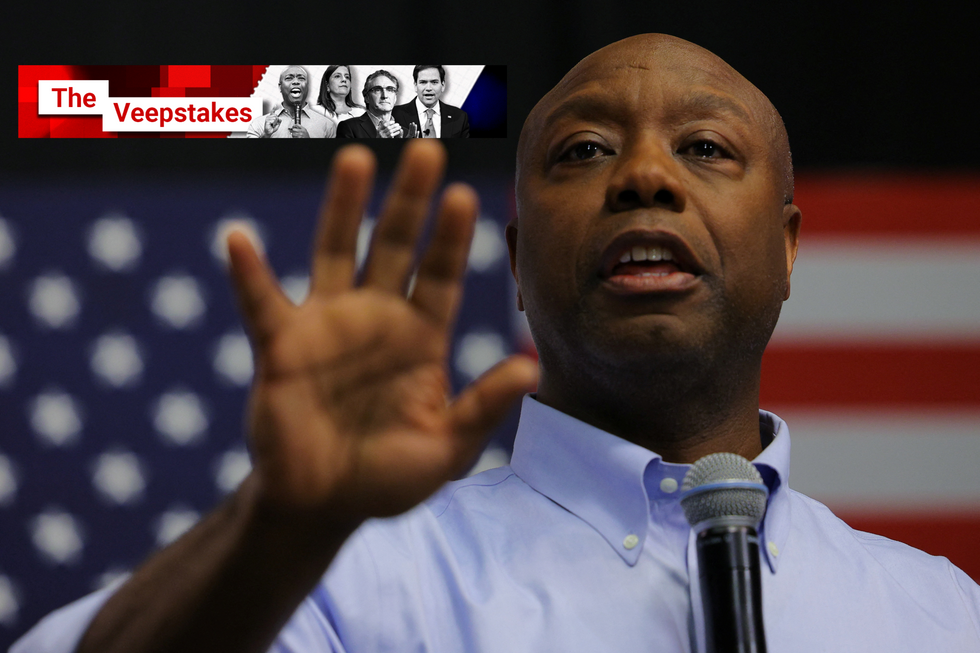
Tim Scott
South Carolina Sen. Tim Scott, who withdrew from the race for the Republican nomination last November, has been campaigning hard for Donald Trump – and he has his eye on becoming vice president. But will the GOP’s only Black senator get Trump’s VP nod?
Raised by a single mom in Charleston, South Carolina, Scott became the first Black Republican elected to any office in the Palmetto State since the 19th century when he won his 1995 Charleston city council race. In 2008, he won a seat in the statehouse and went on to the House of Representatives in 2010. After one term, then-South Carolina Gov. Nikki Haley appointed him to fill a vacant Senate seat, and he has easily won reelection three times. He is arguably the most recognizable elected Black Republican in office today. (Could Tim Scott become Trump's No. 2? Continue to read here.)
Elise Stefanik
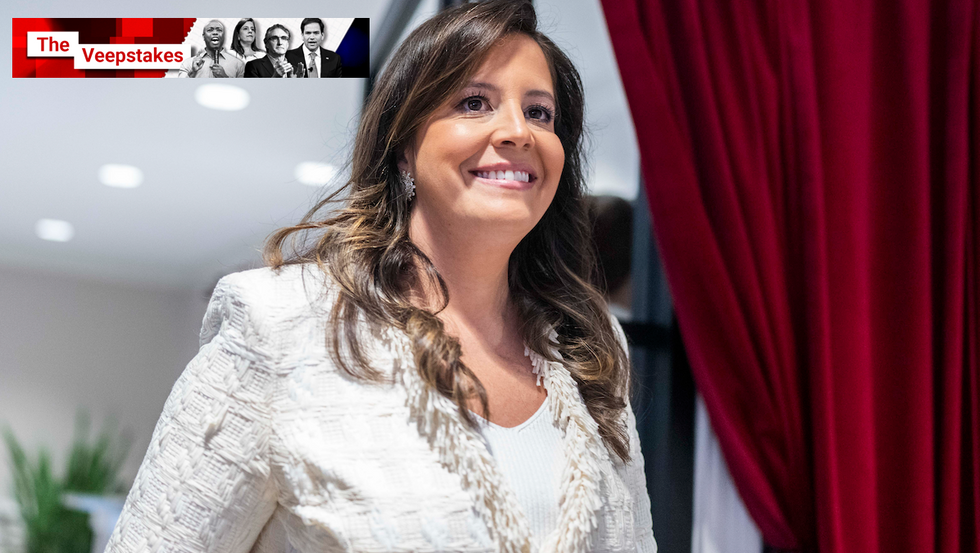
Elise Stefanik
Rep. Elise Stefanik of New York, a rising star of the GOP, is one of the few women on former President Donald Trump’s vice president shortlist.
When Stefanik first entered the national political scene in 2014, she was considered the new face of the Republican Party. At the time, she was the youngest woman ever elected to Congress and widely considered a moderate. Fast-forward to 2024, and Stefanik has drastically shifted to the right. She’s a full-blown MAGA Republican, routinely defending Trump and echoing his talking points – including the white nationalist “great replacement” conspiracy theory. (Could Stefanik, now a full-blown MAGA Republican, become Trump's running mate? Continue to read here.)
JD Vance
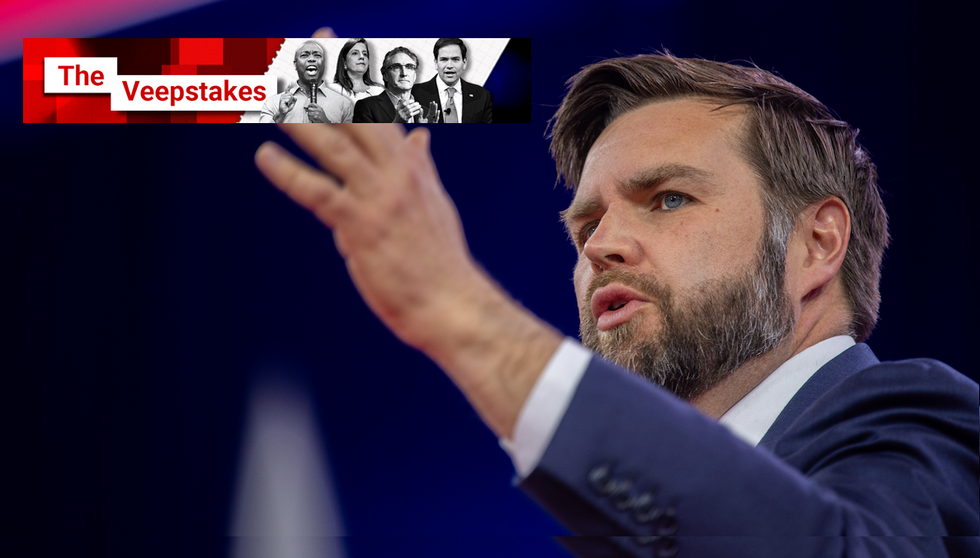
JD Vance
CNP/INSTARimages.com via Reuters
From holler to white collar. That’s the unusual life arc of J.D. Vance, the 39-year-old junior senator from Ohio.
Born into extreme poverty in rural southern Ohio, he grew up in the holler – “the hollow” – surrounded by abuse, addiction, and despair. But he made it out: He joined the Marines, graduated from Yale Law School, and became a successful tech venture capitalist.
He recounted all of this in his bestselling 2016 memoir “Hillbilly Elegy,” which became required reading after Trump’s shock victory over Hillary Clinton spurred interest in the disaffection of white working-class America. In the book, Vance criticized a culture of victimhood and dependency among poor whites while also blasting the establishment’s condescension and neglect. (Could Vance make it to the very top? Continue to read here.)
Marco Rubio
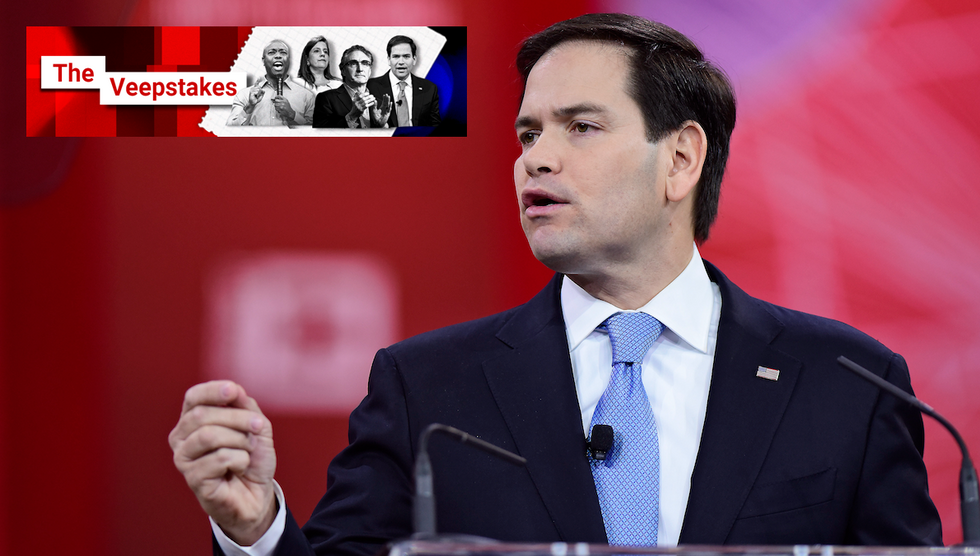
Marco Rubio
Mariana Robertson via Reuters
Florida’s senior senator earned the nickname “Lil’ Marco” for challenging Donald Trump during the 2016 primaries, but he has since forged a close alliance with the former president – so much so that some believe he could be tapped for No. 2.
Rubio was born in Miami to Cuban immigrants who arrived before the 1959 communist revolution — contrary to claims he had long made of them fleeing from Fidel Castro. He speaks fluent Spanish and got his start in politics in 1998 as a city commissioner in West Miami, where the 2000 census showed 87% of residents spoke Spanish as a first language. (Could Rubio stand a chance of becoming the first Latino VP? Find out more here.)
Doug Burgum
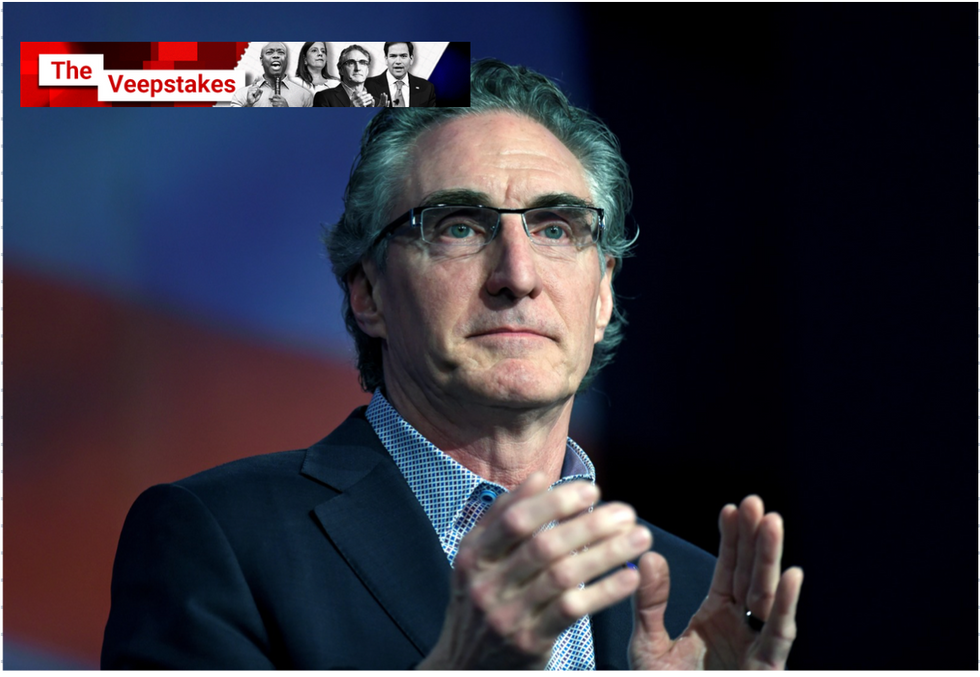
Doug Burgum
When Doug Burgum launched a campaign for the Republican presidential nomination focused on economic growth, energy production, and national security, few Americans outside of the Flickertail State had heard of the former software CEO turned governor of North Dakota. Just to get the 40,000 unique donors needed to make the debate stage, he had to give out $20 gift cards in return for $1 campaign donations. While he’s still far from a household name, he has emerged as a dark horse favorite to become Donald Trump’s vice presidential running mate.
Who is he? The67-year-old Burgum hails from Arthur, North Dakota — a town of roughly 300 residents — and worked as a consultant at McKinsey & Co before leveraging his family farm to start an accounting software company called Great Plains Software, which he sold to Microsoft for $1.1 billion in 2001. (Would Trump fancy a biz-savvy VP pick? Find out more here.)
Wildcards: Could Trump surprise us with his VP running mate?
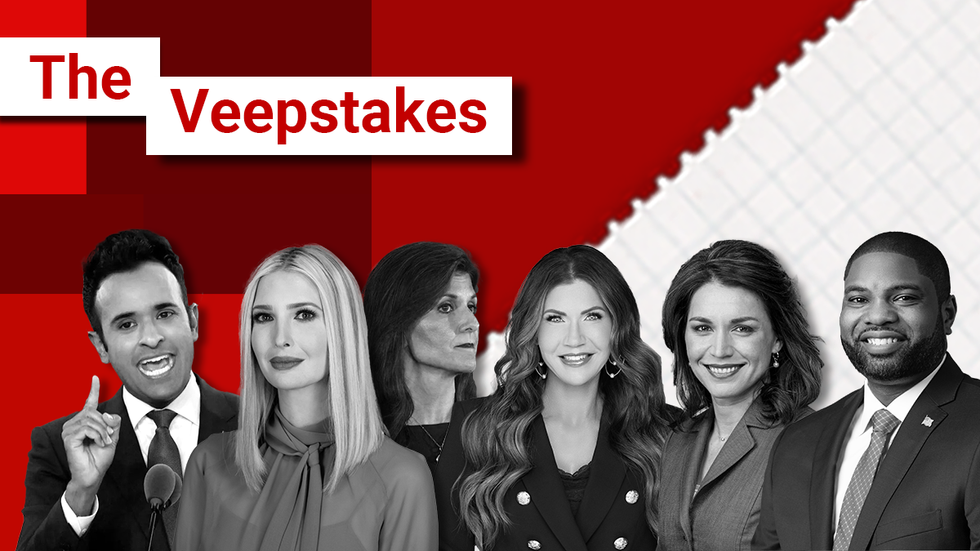
Wildcards: Could Trump surprise us with his VP running mate? Vivek Ramaswamy, Ivanka Trump, Nikki Haley, Kristi Noem, Tulsi Gabbard & Byron Donalds
Luisa Vieira/GZERO Media
Donald Trump has been teasing his vice presidential pick for weeks, but with the Republican National Convention kicking off next week, he’s likely to make it official — and soon.
Right now, the front-runners appear to be Sens. Marco Rubio and JD Vance, along with North Dakota Gov. Doug Burgum. But what about the contenders who aren’t grabbing headlines yet remain on Trump’s radar? Here is everything you need to know about the dark-horse candidates.
Nikki Haley: We know, we know, the former governor of South Carolina and Trump’s former ambassador to the UN fired shots at the former president as his main opponent in the primary. But just because she once challenged him doesn’t mean she wouldn’t be a valuable running mate. (Could Trump surprise us with his VP running mate? Find out more about his wildcard prospects here.)
- Could Doug Burgum be a biz-savvy VP pick for Trump? ›
- JD Vance: Started from the bottom, now he’s here ›
- Trump gambles to woo Black voters ›
- Trump's VP pick remains a secret ›
- Wildcards: Could Trump surprise us with his VP running mate? ›
- Trump's VP pick: The short list ›
- Trump's pick for VP: JD Vance - GZERO Media ›
Will Tim Scott become Trump’s No. 2?
South Carolina Sen. Tim Scott, who withdrew from the race for the Republican nomination last November, has been campaigning hard for Donald Trump – and he has his eye on becoming vice president. But will the GOP’s only Black senator get Trump’s VP nod?
Raised by a single mom in Charleston, South Carolina, Scott became the first Black Republican elected to any office in the Palmetto State since the 19th century when he won his 1995 Charleston city council race. In 2008, he won a seat in the statehouse and went on to the House of Representatives in 2010. After one term, then-South Carolina Gov. Nikki Haley appointed him to fill a vacant Senate seat, and he has easily won reelection three times. He is arguably the most recognizable elected Black Republican in office today.
Trump recently said Scott was a “better surrogate” than a candidate thanks to the latter’s enthusiastic efforts to whip up excitement for the former president’s campaign. If Scott detected any damnation by faint praise in the remark, he certainly didn’t let it on, saying Trump was “right” when asked about the remarks on Fox.
Eurasia Group’s Jon Lieber says Scott “has a great personal story, he’s a telegenic presence, he’s inoffensive, and he has a good reputation in the Senate that comes along with relationships and domestic policy chops.” That said, Lieber isn’t convinced Scott can help Trump consolidate support with voters who aren’t sold on the former president.
Scott recently launched a $14 million campaign to help Trump make inroads with minority voters in seven swing states, which could ease concerns like Lieber’s if successful. We’re watching how it plays out, and whether Scott’s affability helps temper Trump’s hard edge with voters.
To learn about Trump’s other possible VP picks, check out our Veepstakes series here.
Trump's VP pick: The short list
Jon Lieber, Eurasia Group's head of research and managing director for the firm's coverage of United States political and policy developments, shares his perspective on US politics from Washington, DC.
What we're watching in US Politics this month. Who Trump picks as his VP.
The big story in US politics this month is going to be the debates which are going to be one of the key moments of the campaign, given the enormous downside risk they present for President Biden due to his age. But the other big event of the summer, other than the conventions, is going to be who Trump picks for his vice presidential candidate. And there's been a number of names floated by the campaign, some more conventional than others. And they each have their own set of strengths.
Some of the more surprising names would be JD Vance, who Trump's family is allegedly pushing for him to pick. Vance is a senator from Ohio and one of the leading lights in the populous Republican movement. Never mind his Yale and venture capital background, he is somebody that claims he's out there fighting for the working class, which could help Trump.
Tim Scott, an African-American senator from South Carolina would help bring diversity to the ticket. Perhaps match up well against Kamala Harris in the debates, and is a pretty telegenic defender of Trump who has been outspoken in his praise for the former president since he was defeated in the primary.
Another potential candidate is Doug Burgum, the governor of North Dakota, a smaller state. But he's a rich man, a successful business guy who's been a very effective Trump surrogate. And he's emerged as a potential pick in the last few months.
You also have a handful of other senators, like Marco Rubio from Florida, who would put a Hispanic on the ticket, or Tom Cotton, who's been a harsh Trump critic in the past, but would bring a lot of national security credibility to President Trump. There's a couple of House members that are on the short list, unclear if they have the experience or TV presence to be what Trump is looking for.
Typically candidates will choose a vice president based on some political liability that they think they have, whether it's the balance of the ticket in terms of age or gender or racial identity or maybe it's a regional thing. Mike Pence was chosen because he was strong with evangelical voters and Trump was not. It isn't exactly clear what Trump's going for with his VP pick. Probably it's somebody who he thinks is loyal to him, somebody that can defend him well on TV, and probably someone that's not going to show him up too much as an actual vice president. Really any one of the names on this list could achieve those goals, now but what they probably won't do is give Trump a big boost in this campaign, which is going to be about the two headliners, Joe Biden and Donald Trump.
A woman attends a campaign rally by former President and Republican presidential candidate Donald Trump at Crotona Park in the Bronx borough of New York City, on May 23, 2024.
Bloc by Bloc: Trump gambles to woo Black voters
This GZERO 2024 election series looks at America’s changing voting patterns, bloc by bloc.
________________________________
Updated, Nov. 1, 2024: This piece began our Bloc by Bloc series back in May and can serve as an explainer of how portions of the Black community are realigning away from the Democratic Party. But it was written before President Joe Biden dropped out of the race – and, as we all know, he was replaced by Kamala Harris, a member of the Black community herself.
Flash forward to Nov. 1. A nationwide New York Times/Siena College poll of Black likely voters from mid-October found that 80% of Black voters plan to vote for Harris, an uptick from the 74% who said they would vote for Biden.
But it’s all going to come down to turnout. Democrats need a tsunami of Black voters to win the swing states of Georgia and North Carolina, and they have not quite been hitting their targets in the final few days of the campaign.
In North Carolina, where Harris desperately needs to win over Black voters to drive Democratic turnout to offset Trump’s dominance in rural parts of the state, early voting is showing red flags. So far, Black voters are making up 18% of early voting, two points lower than what she is projected to need to win the state.
In Atlanta, where 42% of the population is Black, early voting shows similar warning signals. Republicans are turning out in higher numbers to vote early than they did in 2022. Pollster Mark Rountree suggests the switch is because of a 22% drop-off in early voting in the Black community compared to 2020.
As the results roll in Tuesday, keep your eyes on Atlanta’s Fulton and DeKalb counties and its surrounding suburbs of Gwinnett, Henry, and Cobb. These counties are expected to be bellwethers of how Harris is tracking with Black voters nationwide.
__________
Original version from May 2024:
Donald Trump was trapped in New York City until the jury reached a verdict in his hush money trial last week, but he made the most of his time in his hometown – visiting a bodega in Harlem, dropping by a construction site, hosting a photo op at a local firehouse, and becoming the first Republican candidate to host a campaign rally in New York City since Ronald Reagan.
His choice of rally location – a deep-blue district in the Bronx where 95% of the population is Black or Hispanic and 35% live below the poverty line – was no accident. While Black voters remain the most loyal bloc of the Democratic coalition that Joe Biden and Kamala Harris stitched together four years ago, that support appears to be waning.
Six months before the election, Trump has picked up as much as 18% of the Black vote — up from 8% in 2020 and 6% in 2016. Polls can only tell us so much this far out from the election, but a recent poll conducted by the University of Chicago found that just 33% of young Black people would vote for Biden if the election were held today. While the poll showed significant undecided and third-party sentiment – only 23% said they would support Trump – it's undeniably a plummet from the 80% of young Black voters supporting Biden in 2020.
Trump’s message to Black voters is that Democrats have long taken their vote for granted and that they were better off – in particular from an economic standpoint – under his administration than under Biden’s. With November’s election predicted to be decided by a few thousand votes in a couple of key states, it matters that Trump is trying, and succeeding, to make inroads with voters of color.
At his rally in the Bronx on May 23, Trump cast himself as a better president for Black and Hispanic voters, attacking Biden on the economy and immigration. He insisted “the biggest negative impact” of the flood of migrants to New York is “against our Black population and our Hispanic population who are losing their jobs, losing their housing, losing everything they can lose.” Many in the crowd responded by chanting, “Build the wall,” a reference to Trump’s push as president to build a US-Mexico border barrier.
“I’ve voted for Democrats in the Bronx up and down the ticket for my whole life,” rally attendee Daniella Martinez said. She still identifies as a Democrat but decided to hop on the Trump train because she worried the influx of migrants to the city was straining her daughter’s public school and making their neighborhood less safe. “But look where Democrats have got New York. I’m here because I am ready for a change.”
When pressed about whether Trump could be considered a change, given that he occupied the Oval Office just four years ago, Martinez said: “I didn’t have to work a second job four years ago. Any change from Biden’s economy is a change I am going to vote for.”
Since Trump’s guilty verdict last Thursday, he has compared his legal troubles to the unfairness that Black communities disproportionately face in the justice system. Tim Scott, the only Black Republican in the Senate, amplified this on CNN on Friday. “The reason we’re seeing so many African Americans come into the Trump campaign — two big things: jobs and justice,” he said. “As an African American born and raised in the Deep South who had concerns about our justice system as it relates to race, I’m now seeing it play out from a partisan perspective.”
Scott, who wants to be Trump’s vice president, has pledged $15 million of PAC money to Black voter outreach, arguing that Black men, in particular, could be key in securing Trump’s win. On Tuesday, Reps. Byron Donalds, of Florida, who is also rumored to be on Trump’s VP short list, and Wesley Hunt, of Texas, ventured into Philadelphia to make their pitch for Trump at an event billed as “Congress, Cognac, and Cigars.”
“We were better off under Republicans than we were Democrats,” Hunt said. “The reason why the Democrats have a hold on the Black community is because our parents’ parents’ parents keep telling us, ‘You got to vote Democrat. It’s up to us in this generation to say, ‘well, why?’”
But according to Eurasia Group’s US analyst Noah Daponte-Smith, what may matter more than Trump’s marginal gains with Black voters is that Biden is hemorrhaging their support.
“Biden is currently running 22 points behind his 2020 performance among Black voters, says Deponte-Smith. “There does seem to be a consensus among analysts and political scientists that the Black vote has steadily moved away from Democrats as we have exited the Obama era.”
But Biden is fighting back. The president has ridiculed Trump’s strategy, saying last week that Trump is “pandering and peddling lies and stereotypes for your vote, so he can win for himself, not for you.”
He and Vice President Kamala Harris also traveled to Philadelphia last Wednesday to launch “Black Voters for Biden-Harris” to bolster outreach efforts and engage Black voters. The campaign is an acknowledgment that Biden knows he needs to fight if he wants to keep the 92% majority of Black voters that were integral to his win in 2020.
The identity politics trap
From race to gender to profession to nationality, we define who we are in a million different ways. Many people feel strongly about those identities; they are a fundamental part of how we see the world, find community, and relate to each other. But despite good intentions on the progressive left, at what point does focusing on what makes us different from each other hurt our society more than it helps? When does a healthy appreciation for culture and heritage stifle discourse and deny mutual understanding?
On GZERO World with Ian Bremmer, political scientist and author Yascha Mounk weighs in on identity, politics, and how those two combine to create the complicated, contentious idea of “identity politics.” Mounk’s latest book, “The Identity Trap,” explores the origins and consequences of so-called “wokeness” and argues that a counter-productive obsession with group identity has gained outsize influence over mainstream institutions.
"I think the important thing is not to build a culture in which we are forced to double down on narrow identities," Mounk tells Bremmer, "in which we cease to build the broader identities, like ones as Americans, but allow us to sustain solidarity with people who are very different from us."
Catch GZERO World with Ian Bremmer every week at gzeromedia.com/gzeroworld or on US public television. Check local listings.
Ian Explains: Will voters care about "anti-woke" politics in 2024?
What happened to the war on wokeness?
For the past few years, the battle against the “woke mind virus” has dominated Fox News’ nightly coverage, but lately, Fox has led with issues like immigration and inflation. Self-styled “anti-woke” 2024 GOP primary candidates Tim Scott and Vivek Ramaswamy are already out of the race, and anti-woke crusader Ron DeSantis’ poll numbers fell by 20 points in the last year.
Does this mean conservatives no longer care about fighting the “woke mob”? Not exactly. Landmark SCOTUS rulings striking down things like abortion and affirmative action and upholding religious and gun rights have signaled to voters that progressive policies have successfully been dismantled, so there’s less urgency from the right.
But an anti-woke worldview is still very much a part of conservative identity. Just look at the backlash, especially on the right, to last month’s Congressional hearing about anti-semitism on university campuses, which quickly forced the presidents of Harvard and UPenn to resign. Republicans may no longer identify as anti-woke, but anti-woke by any other name is still the heart of conservative values.
Catch GZERO World with Ian Bremmer every week at gzeromedia.com/gzeroworld or on US public television. Check local listings.
No-show Trump wins first GOP debate
Jon Lieber, head of Eurasia Group's coverage of political and policy developments in Washington, DC shares his perspective on US politics.
Who were the big winners and the big losers from this week's Republican debate?
Three clear winners were probably Vivek Ramaswamy, who's done pretty well in making a name for himself as a first time politician, and came across as likable and energetic, full of some fresh ideas that are probably going to appeal to a lot of Republican voters who were otherwise thinking about supporting President Trump. Two is Nikki Haley, the former UN ambassador and governor of South Carolina, who had herself a pretty good night scoring some points against Ramaswamy on foreign policy, and coming across as competent and credible. And of course, the third winner is Donald Trump, who didn't show up but kind of dominated the proceedings anyway and continues to be the front-runner even after the debate.
On the loser side, you had a couple of people who just didn't have great nights. Chris Christie got resoundingly booed for his strategy of attacking Trump and presenting himself as the alternative, or trying to create space for somebody else to get in that lane. Mike Pence really did nothing to distinguish himself. In fact, I kind of forgot he was up there at times, as I've forgotten that he's even running for president right now. Same with Tim Scott, who I think has a very great story and is a very likable guy, but just isn't resonating with a lot of Republicans.
And the biggest loser was probably Ron DeSantis, who's presented himself as the most credible alternative to Trump so far but has really been tailing off in the polling, has shown himself to be vulnerable to people like Ramaswamy, and last night didn't really do much to change that narrative. He kind of has his line of attack against the cultural left, which resonates with a lot of Republican voters. But there's no real reason to prefer him over President Trump at this point, and there probably aren't enough Republican voters who will do so, that will help propel him to the next level.
There won't be any votes cast in this election until Iowa, which is next year. And in the meantime, there's going to be another debate, probably also without Trump, in California, in late September. So, stay tuned for an entertaining Republican primary, but one that kind of feels like they're play-acting a little bit without the dominant force, former President Trump, up on stage.



